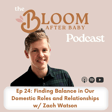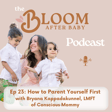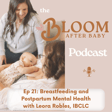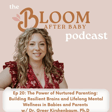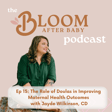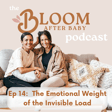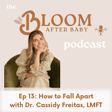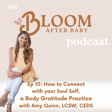
12. Hey Dads: The Transition to Fatherhood, with Eric Jordan
The dads are back! Jen sits down with her husband Eric to hear all about his hindsight 20/20 take on the transition into parenthood. We discuss what he wishes he’d known before becoming a dad and some of the most challenging emotional and psychological transitions. We dive into relationship dynamics, the roommate stage (and why it’s not what we initially thought it would be), and myths and biases around gender norms. We share lots of our personal experiences, plus some of our biggest mistakes and revelations.
This is a good one to share with a new or expecting dad!
HUGE gratitude to ALL the men out there who are being change-makers and cycle breakers!!
Links and resources mentioned in the episode:
Sad Dads: Recognizing Paternal Postpartum Depression
Our Free Guide to Addressing Resentment in Your Relationship After Baby
Why We Can't Ignore Dad's Mental Health
If you enjoyed this episode and appreciate what we share here, please rate and review the show in your favorite podcast app! And come find us on Instagram @bloomafterbaby!
*Please note that this podcast is intended for educational purposes only, and is not a substitute for seeking individualized care from a mental health or medical professional*
Stay Tuned for more to come from Rachel Daggett and Dr Jen Jordan on all things motherhood and mental health - real mom experiences and insights from a licensed psychotherapist and medical doctor.
Learn more about us and access all of our courses, services, and free resources at bloomafterbaby.com
Pregnancy tips Postpartum wellness Prenatal care New motherhood Postpartum recovery Maternal health Pregnancy journey Expectant mothers Postpartum support Motherhood experience Parenting advice Family dynamics Parenting tips Raising children Family well-being Parenting challenges Family relationships Parenting insights Mental health for mothers Emotional well-being Health at Every Size Coping with motherhood Maternal mental health Self-care for moms Stress management Emotional resilience Conversations with experts Interviews with mothers Real-life parenting stories Expert advice for moms Support for new mothers Insights on motherhood Informative parenting discussions Working moms Empowering mothers Couples therapy Psychotherapy Breastfeeding tips Sleep during pregnancy Postpartum nutrition Marriage and Family Marriage after baby Balancing work and motherhood Pregnancy self-care Healthy pregnancy habits Relationships Intuitive Eating Mindfulness Body Acceptance




